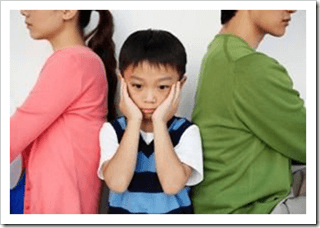Divorcing Parents: Don’t See Divorce As a Failure

Family Portrait
By Rosalind Sedacca, CDC
We all know divorce marks the end of a marital relationship. But when children are involved, it need not mean the end of the family. This is an important distinction for both parents and children to grasp. It can affect how that family is impacted by the divorce.
Too often in our culture we look at divorce as a failure. That negative label puts an added emotional burden on parents when they are already feeling vulnerable, ashamed, anxious and confused.
Rather than reflecting failure, divorce can be a solution for families. This is especially true for families that have been living with tension, anger, disrespect or other highly charged emotions. For those families divorce may become an intervention. It changes the form of a family, but need not mean the end of that family from a child’s eyes.
Parents who work on reframing their perspective on divorce can see it without the negative judgment. That mindset paves the way for a smoother transition into co-parenting success. It also helps children accept the divorce as a challenge they have to face. But not an overwhelming obstacle they have to overcome.
Parental attitude makes all the difference.
When we focus on divorce as about change and not about blame, we give our children the ability to adapt and accept more easily. Change is a natural part of everyone’s life. Kids regularly change their favorite sports, hairstyles and hobbies. They adapt to new teachers, new classmates and new grade levels at school. They accept different academic demands as they age. Life is full of changes and good parents help their children embrace these changes as part of growing up.
When parents make their divorce about change, and not about failure, much of the shame, blame, fear and anxiety attached to divorce loses its impact.
Most all divorce professionals agree that it’s not divorce itself that scars children. It’s how parents approach the divorce that does most of the damage. Those parents who step up as positive role models make life easier for their children. They talk with their kids about accepting change and overcoming challenges. They set examples for coping with stress and conflict without overstepping boundaries. They listen with compassion to what their children are saying. This kind of loving support helps children thrive at a time when they need their parents most.
Turning a challenge into a learning opportunity.
Here are some suggestions for minimizing judgment and maximizing a positive attitude when talking to your kids about your divorce.
- Encourage children to love and stay in contact with their other parent without guilt, shame or fear.
- Avoid being critical when talking about their other parent and find positive things to say when referring to them.
- Listen empathically when your children vent or express their feelings about the divorce, even if you don’t agree. Show understanding and acknowledge their right to their feelings.
- Offer your children outside support through school counselors or therapists if they are having problems you can’t easily remedy.
- Never lie about, distort or exaggerate information as a way of alienating or turning your children against their other parent.
- Resist the temptation to use your children as your confidants, even older teens. Find divorce professionals to talk to.
No two divorces are the same. Nor are children all alike in how they experience or accept divorce. But they all look to us as parents for guidance in how to navigate this new and challenging period in their lives.
Parents must hone their skills in adjusting to and accepting change. They can see change as an opportunity to do new things and have new experiences. That way their children are more likely to embrace changes related to divorce with greater ease. Parents who express resistance and lament about what used to be, suffer. They also get caught in a victim mindset of despair and helplessness. Sadly, their kids are more likely to follow suit.
With the right attitude your divorce can become a learning opportunity of immeasurable value. It will also benefit your children in the months and years ahead.
Everything in life is affected by our choices. Make the choices now that your children will thank you for when they are grown. The lessons they learn today will stay with them for a lifetime.
*** *** ***
Rosalind Sedacca, CDC is the founder of the Child-Centered Divorce Network, a Divorce & Co-Parenting Coach and author of numerous books and e-courses on divorcing with children and co-parenting successfully. For instant download of her FREE EBOOK on Doing Co-Parenting Right: Success Strategies For Avoiding Painful Mistakes! go to: childcentereddivorce.com/book
Please share this article on social media!
© Rosalind Sedacca All rights reserved.
